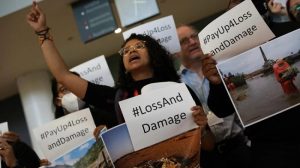As the first crucial week of negotiations ended at the 2022 midyear Bonn climate talks, green groups are beginning to raise red flags on the seeming lack of progress on agenda items for the meeting, amid important delegates being denied entry visa.

The campaigners are accusing negotiators from rich and developed countries of blocking real progress on the issue of financing for loss and damage, put on the front burner of the negotiations by poor countries.
Loss and Damage can be regarded as climate reparations – financial support given to communities living with the destructive effects of the climate crisis either through displacement or destruction of their livelihoods.
Charles Mwangi, the Acting Executive Secretary at the Pan African Climate Justice Alliance (PACJA), revealed that progress on loss and damage finance is being blocked by rich countries on many fronts. Some of these, according to him, “range from outright visa denials for negotiators from Africa to needless delay tactics in the negotiations.”
“We consider the denial and delay of visas to Germany for many negotiators from developing countries as part of the grand plan to whittle down the glamour for a financing facility for loss and damage,” Mwangi said.
“The denial or delay in visa issuance is one of the challenges we are facing here as negotiators,” Ephraim Mwepya Shitima from Zambia said.
Shitima, who heads the African Group of Negotiators (AGN), confirmed that with some whole country delegations missing the talks due to visa challenges, the group had to submit a formal complaint letter to the UNFCCC leadership, and action is being taken in that regards.
The AGN comprises lead thematic coordinators and strategic advisors from governments of African member states. Established at COP1 in Berlin, Germany, in 1995 to unify and represent the interests of the region in the international climate change negotiations, the AGN works under the guidance of the Committee of African Heads of State and Government on Climate Change (CAHOSCC) and the African Ministerial Conference on Environment and Natural Resources (AMCEN)
“The delay tactics rich countries employ through clauses and terminologies that attempt to evacuate meaning in this negotiation process further endanger the lives of African women who are first-line victims of climate disasters,” Priscilla Achakpa of the Women Environmental Programme (WEP) said.
Muawia Shaddad of the Sudanese Environment and Conservation Society, a member of the Pan African Climate Justice Alliance (PACJA), believes progress is hindered by the demand for loss and damage finance by developed countries because rich countries are convinced it could lead to their being legally liable for the impacts of climate change.
“We have seen promises upon promises, and we know that promises cannot lift victims of climate change out of disasters – only action on financial promises can. By the way, where is the $100 billion per year promised by rich countries?” Shaddad wondered.
It will be recalled that, in 2009, rich countries promised $100 billion per year in “climate finance” to help poorer nations reduce their emissions through things like renewable energy and sustainable agriculture. That promise is yet to be fully delivered as each country determines its own contribution.
A report released by the Organisation for Economic Co-operation and Development (OECD) in October 2021 asserts that the annual $100 billion in climate finance that high-income nations promised to the world’s lower-income countries to help deal with the effects of a warming planet will not be delivered until at least 2023.
But many poor countries say that funding doesn’t help with the climate impacts they’re already experiencing, which is why a separate loss and damage fund is needed. In 2020, it was estimated that natural disasters caused $210 billion in damage across the world.
Reports from the Intergovernmental Panel on Climate Change (IPCC) among other UN evidence-based reports indicate that rich countries, like the United States of America and those in the European Union, are responsible for most of the heat-trapping emissions pumped into the atmosphere since the Industrial Revolution. While poor countries, with their lower emissions, are still bearing the brunt of a hotter climate through more severe heat waves, floods and droughts.
To help compensate for these losses, poor countries are asking richer ones to contribute to a loss and damage fund. The money could offer payment for things that are irrevocably lost, like lives or the extinction of species. It could also help countries with the cost of rebuilding after storms, replacing damaged crops, or relocating entire communities at risk.
Climate activist and founder of the Rise Up Movement, Uganda, Vanessa Nakate, says many people on the African continent suffer some of the worst impacts of climate change. Because of this, she continued, “coastlines are disappearing, islands are vanishing from sight, species are fading, cultures are becoming extinct, and history is disappearing. We need a finance facility for loss and damage at COP 27, and this is our unwavering demand.”
“There’s been a lot of conversation with a lot of talking but less action and we need that right now. The more there is a delay in action; the more people will continue to suffer. We know that the polluters are in this space, and we also know that they are blocking progress, but we must put people on the agenda on the agenda because, in the end, it’s people that are suffering; how are we going to help them? That should be the conversation we should be having now,” Nakate added.
Courtesy: PAMACC News Agency
